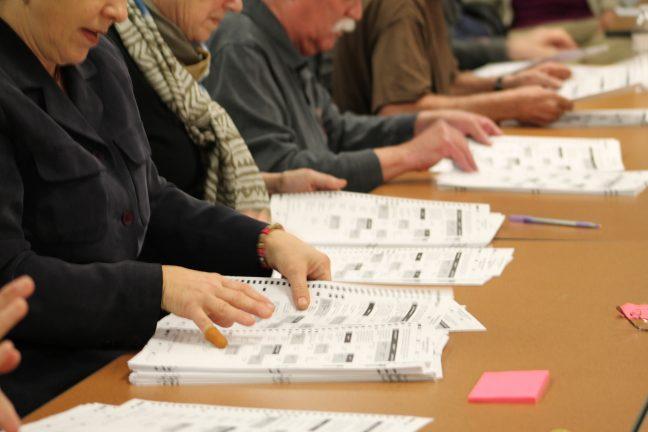The midterm election is set to take place Nov. 8. The ballot will contain candidates for both statewide and local positions, along with a few referendum questions.
In the pivotal gubernatorial race, incumbent Tony Evers will be running on behalf of the Democratic Party, and Tim Michels will be the Republican candidate on the ballot.
Candidates are increasing their campaign efforts across the state of Wisconsin and in Madison specifically as the election approaches.
Evers visited with supporters near the University of Wisconsin campus Sept. 27 and held an early vote rally on campus Oct. 26 with other Democratic candidates up for re-election. Michels and Republican candidate for attorney general Eric Toney visited with the College Republicans on campus Oct. 25.
Republican Sen. Ron Johnson will be running for re-election for the Class 3 U.S. Senate seat. Lt. Governor Mandela Barnes will be opposing Johnson as the Democratic candidate in the race.
For Attorney General, Republican candidate Eric Toney will be running against Democratic incumbent Josh Kaul.
Other pivotal races in this election include lieutenant governor, secretary of state, state treasurer, representatives in the U.S. House of Representatives, state senators from odd-numbered districts and state representatives, according to Municipal Clerk and Public Information Officer Maggie McClain.
For voters in Dane County, offices on the ballot will specifically include the representative in Congressional District 2, representative to the Assembly District 76, Dane County sheriff and Dane County clerk of circuit court, according to MyVote Wisconsin.
The Dane County referendum questions will be on the topics of marijuana and abortion, according to MyVote Wisconsin.
The incumbent from Congressional District 2, Rep. Mark Pocan (D-Kenosha), is running against Republican Erik Olsen and Independent Douglas Alexander, according to the Wisconsin Elections Commission.
The incumbent and only candidate running to be representative of Assembly District 76 is Francesca Hong, though the ballot does include a write-in section, according to the Wisconsin Elections Commission.
The Dane County sheriff’s race is between Democratic incumbent Kalvin Barrett and Republican Anthony Hamilton.
The only candidate for the Dane County clerk of circuit court is Democratic incumbent Carlo Esqueda, according to MyVote Wisconsin.
Because there are so many offices on the ballot, Sen. Kathleen Bernier (R-Chippewa Falls) said some positions can go without recognition during each election.
“The one statewide race that doesn’t ever get enough attention is the secretary of state position,” Bernier said. “In most states, the secretary of state is very instrumental in running elections, among other things and is a very important position.”
Secretary of state candidates include Democratic incumbent Doug La Follette, Republican Amy Lynn Loudenbeck, Libertarian Neil Harmon and Wisconsin Green Party candidate Sharyl R. McFarland, according to MyVote Wisconsin.
Though the ballots will include the candidate’s party affiliation, Bernier encourages voters to do research on candidates before voting for them based on party lines.
“Let’s face it, we all lean one party or the other but to blindly just vote for people one party or the other is probably not advisable,” Bernier said. “You just really need to know who’s running and why they’re running.”
UW political science professor David Canon shared his thoughts on the election’s potential national outcomes and how it affects UW students.
Though many of the seats up for election are not national offices, Canon said they still matter for UW students’ futures.
“National politics are so important for everything from the environment and climate change — they just passed the biggest climate change spending bill we’ve ever had at the end of the summer,” Canon said. “That kind of thing would not be happening in future Congresses if you didn’t have unified Democratic control because the Republican Party has definitely indicated they’re not in favor of spending on issues like that.”
Canon also mentioned the economy as an aspect of why elections matter.
Because students are often interested in getting jobs when they graduate, if the economy is doing well, job prospects when they graduate are better than they would be if the economy was in a recession, Canon said.
All of these things, including abortion and other issues, are going to be shaped by the outcome of these elections in November, according to Canon.
Additionally, Canon described the election’s outcome as having a big impact on state support for UW.
“State support for UW is not likely to increase much with the split right now in state government with Republicans controlling the state legislature and a Democratic governor, but what Tony Evers has been able to do for UW is to prevent any bigger budget cuts that we saw in the previous eight years or so,” Canon said. “UW has a smaller share of state support, so state politics has a bigger impact on UW directly because it does provide a fair amount of our budget still.”
As the election approaches, the City of Madison Clerk’s Office is prepared for a high voter turnout rate on Election Day — especially given Wisconsin allows same-day voter registration, according to McClain.
A report from the Wisconsin Elections Commission indicated 64% of Dane County residents were registered to vote as of July 1.
“We have to be prepared for lots of registrations coming in on Election Day, and that is especially a consideration we make for those campus wards,” McClain said. “So many students register on Election Day at their polling place, so we’re prepared for that.”
A full list of offices on the ballot, including incumbents and opponents, can be found on the Wisconsin Elections Commission‘s website. Information on voting, including registration and polling place information, can be found on My Vote Wisconsin’s website.


